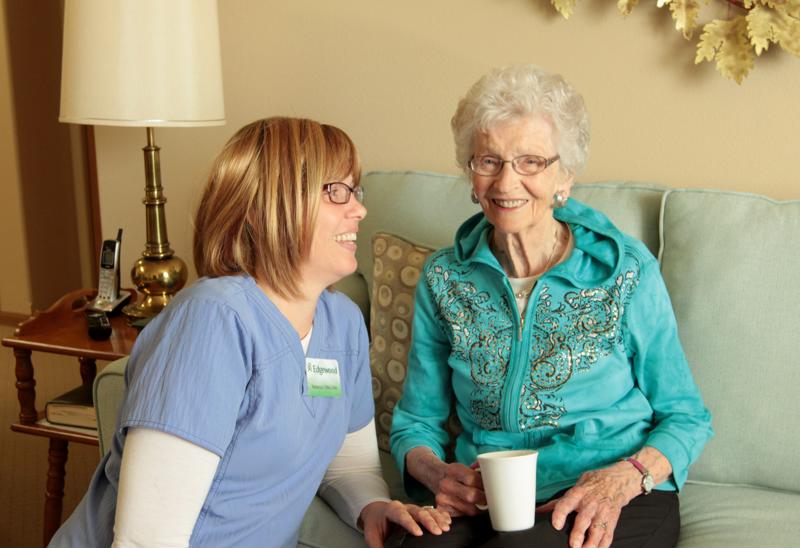
You see the friendly faces of Edgewood staff every day. You watch them share laughs with residents, update family members on their loved ones’ care plans, and lead fun group activities. While nurses play an active role in the daily routines of senior living communities, their duties don’t stop there. What they do behind the scenes is just as important. Read on for an inside look at how Edgewood nurses are reshaping senior health care with the medication reduction program.
What is the Medication Reduction Program?
Vice President/Chief Nursing Officer of Edgewood Management Group Michael Johnson, RN, provided detailed insight about this initiative. Though the medication reduction program involves an intricate strategy to optimize Edgewood residents’ health and quality of life, the main goal is to reduce the number of medications seniors take.
Find Senior Living Near Me
Of course, some prescriptions are necessary for senior health, Johnson explained. For example, residents with diabetes may require the use of insulin to manage their blood glucose levels safely. As such, the aim of this initiative isn’t to force residents out of taking needed medications. Instead, it’s to see if the drugs’ purposes overlap, whether the side effects inhibit seniors’ quality of life, and if the medicines are all necessary.
Reducing medications can have incredible advantages for seniors. Johnson outlined some of the essential facts that act as motivators behind this program:
- Using four or more medications can increase the risk of falls in seniors.
- Edgewood residents were taking an average of 12 medications daily.
- Some of the most common side effects of medications are gastrointestinal issues and dizziness. These may cause other health problems, such as unintentional weight loss or difficulty with balance.
- Seniors are more susceptible to declining vision, hearing, and memory loss, which can make managing medications and adhering to instructions more difficult. Thus, there’s a higher risk for misuse.
- Many seniors see more than one doctor. As a result, communication about what medications they are taking can be a challenge for physicians.
 Balancing multiple medications can be challenging for seniors and comes with risks.
Balancing multiple medications can be challenging for seniors and comes with risks.
How the Program Works
Edgewood staff meet with residents and their family members or legal representatives. They review all medications, including prescriptions, over-the-counter drugs, and nutritional supplements. Staff liaise between residents and medical professionals to ensure all medications are appropriate, necessary, and up-to-date. The ongoing assessment may involve reductions, additions, or changes to medication regimens. However, the decisions are ultimately up to residents and their care providers.
The Beginning Steps
In 2013, Johnson convened with the quality assurance and risk management teams to tackle the problem of falls in seniors. After all, a third of adults ages 65 and older experience a fall each year, according to the Centers for Disease Control and Prevention. The group determined that the sheer volume of seniors’ medications may be at play. By looking at residents’ medication regimens, they found that many seniors were taking several prescriptions for a single condition, and their treatment plans involved an astounding average of 12 medications per resident.
Quality assurance selected an RN from each state with an Edgewood senior living community to meet and discuss the topic. Deemed the medication reduction committee, the nurses’ team communicated these statistics to Edgewood staff. Everyone wanted to reduce the number of resident injuries due to falls or medications, but how could that be achieved? The potential answer is the medication reduction program.
Though separated by distance, the medication reduction committee meets regularly and communicates through emails and phone conversations. This method allows them to continuously reevaluate the medication reduction program strategy, determine their progress, and review their plans for possible modifications.
 Edgewood staff is dedicated to enhancing residents’ quality of life.
Edgewood staff is dedicated to enhancing residents’ quality of life.
The Success of the Medication Reduction Program in Edgewood Communities
The medication reduction committee has seen great success through its efforts. Johnson specified that some communities have reduced the overall volume of medications by 80 percent. Particularly notable is that a memory care community in Nebraska reduced the average to 5.2 medications per resident.
On October 1, 2015, the committee launched a medication reduction campaign targeting Edgewood’s memory care assisted living communities. The marketing team has developed posters and pamphlets to educate residents’ family members and legal representatives about the importance of evaluating loved ones’ medication regimens. The goal is to reduce medications to six or fewer per senior.
“This should not be just an Edgewood thing.”
The Future of Medication Reduction
The efforts of the medication reduction committee are being recognized well outside Edgewood communities. Johnson explained that he has received several invitations to speak about this initiative. He’s also had multiple requests for the committee’s information on the data, including from a senator’s office. He’s spoken at a conference in Madison, Wisconsin, for chief nursing officers, nursing executives in assisted living and skilled nurses, rotary clubs, and at the University of North Dakota College of Nursing.
“It’s a really good clinical standard of care and has become a best practice,” Johnson explained. “This should not be just an Edgewood thing.”
Johnson said that the committee is continuously looking for opportunities to expand this program, and the data will point the team in the right direction. The group wants to create more measurable outcomes for the initiative, such as determining whether residents’ weight becomes more stabilized due to medication reduction and how their overall quality of life is improved.




